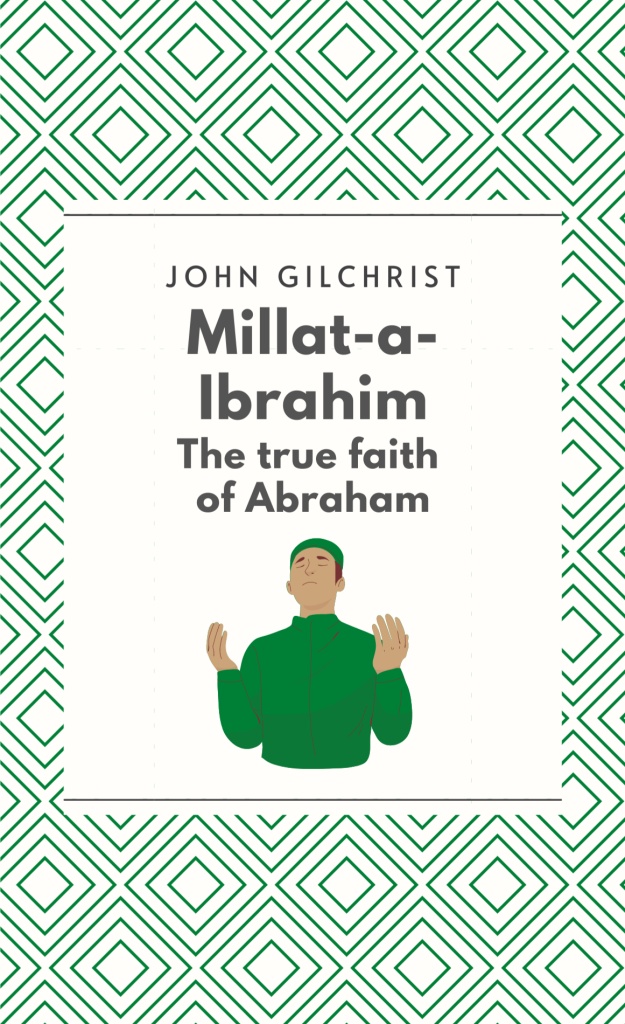An Example and Prototype of the True Religion to Come
Millat-a-Ibrahim: The True Faith of Abraham


Chapters
« Ch. 3 - The Father of All True Believers
Although all three religions look to Abraham as a leader and the father of all true believers, none regards him as its founder or its most prominent figurehead but sees him solely as a prototype and example of what was yet to come. This is the third great point of agreement between Judaism, Christianity and Islam regarding Abraham's prophetic office.
In Judaism, Moses has always been regarded as the true founder of the religion of the people of Israel for it was to him that God's law was given. All the religious books of Judaism, including its Scripture and its traditional works (such as the Mishnah) distinguish him above all the other prophets of God. Some strictly orthodox Jews once summed it up when they said "We are disciples of Moses" (John 9:28). Jesus Christ himself also spoke to the Jews of Moses as "him on whom you set your hope" (John 5:45). The place Moses has in Judaism is well summed up in this description of Jewish worship:
For from early generations Moses has had in every city those who preach him, for he is read every sabbath in their synagogues. Acts 15:21
Christianity likewise looks to another man of God as its founder and central figure, namely Jesus Christ. Although Abraham is highly respected and honoured as a fine example of true faith, Jesus is the real founder of Christianity and its ultimate patron. Christians view the faith of Abraham as symbolic of their own faith in Jesus Christ, both being based on an implicit trust in the revealed faithfulness of God rather than any merit in the life and works of the believer. In our view the covenant God made with Abraham was precisely a shadow of the real covenant to come. God said to Abraham:
"Surely I will bless and multiply you". Hebrews 6:14
The covenant which God later made with Moses, a covenant of law, was based on commands which placed the responsibility of compliance squarely on the shoulders of those with whom it was made, namely, "You shall be holy, you shall keep my commandments, you shall be careful to observe my statutes" and, negatively, "You shall not kill, you shall not steal, you shall not commit adultery", etc. These were the kinds of commandments God gave to the people of Israel. But to Abraham God said simply, "I will bless you". This was not the "you shall ... you shall not" of the Mosaic Law. God, when making promises to Abraham, said "I will bless you ... I will make your name great", etc., thereby holding himself responsible for the fulfilment of the covenant he made with him. Abraham's part was to trust in God and to believe that he would do what he had promised.
In this way we see Abraham's faith in God as an example of a true Christian's faith in Jesus Christ. We trust in the promise God made to send a Saviour, we have faith in Jesus Christ as our Redeemer, and we are saved by God's grace through the great work of salvation he wrought through his crucifixion and resurrection. Abraham's faith is well described in this outline of his trust in God that he would duly receive the son which God had promised to him:
No distrust made him waver concerning the promise of God, but he grew strong in his faith as he gave glory to God, fully convinced that God was able to do what he had promised. Romans 4. 20-21.
Here we find what really commended Abraham to God, not his good deeds or religious works, but his faith that God would fulfil his promise. It was because he so trusted God that "his faith was reckoned to him as righteousness" (Romans 4:22). In this he was an example of true Christian faith which depends on God's grace in sending his Son to save us from our sins just as he had promised through the prophets who came before him. So our Scriptures say that as Abraham was declared righteous by God because he trusted in him, so we too will be equally regarded if we place all our confidence and trust in Jesus as our Lord and Saviour.
But the words, "it was reckoned to him", were not written for his sake alone, but for ours also. It will be reckoned to us who believe in him that raised from the dead Jesus our Lord, who was put to death for our trespasses and raised for our justification. Romans 4:23-25.
Abraham did not try to gain God's favour through his own piety or self-righteousness - he put all his confidence in God's grace and faithfulness. He is thus an example of true Christian faith for we likewise do not seek our own glory but trust in what God has done in Jesus Christ. This helps, furthermore, to give the title "the friend of God" more meaning. The marks of friendship are trust, loyalty and a close personal relationship. Abraham was not commended for any good work but was regarded for what he was. God took him as a friend.
His good standing depended not on some form of individual righteousness by which he gained God's favour, but a personal relationship based on mutual friendship. This is precisely what true Christian faith is. All true Christians are declared in the Christian Scriptures to be "children of God" (1 John 3:1), people who have a personal relationship with their Father in heaven. Through faith in Jesus we too enter into the same covenant of grace, faith and the promises of God which cha-racterised God's relationship with Abraham. So we read in this passage of our identification with Abraham in a covenant based on faith in the promises of God:
That in Christ Jesus the blessing of Abraham might come upon the Gentiles, that we might receive the promise of the Spirit through faith. Galatians 3:14
In Islam we likewise find that the central figure is not Abraham, even though he was declared to be an imam for mankind. Muhammad, proclaimed in Islam as the last and greatest of God's prophets, is the ultimate founder and figurehead of the religion. Yet, as with Judaism and Christianity, Abraham's own faith is set forth as a good example of true Muslim faith and in the Qur'an Muslims are bidden:
Say, we follow the faith of Abraham the upright. Quran 2.135
Once again Abraham is regarded as an example of true faith and the Qur'an thus highly commends the millata-Ibrahim, the "faith of Abraham". Yet, as pointed out already, there is a clear distinction between Christian and Muslim views of what Abraham's faith really was. Islam determines it principally as submission to the oneness of God. The Qur'an thus summarises his faith as follows:
Behold! His Lord said to him, "Submit". He said, "I have submitted to the Lord of the Worlds". Quran 2.131
The very word fs/am means submission and a Muslim is one who submits to God. Both words come from the same root letters. In Quran 2.130 we again read that the true faith of a Muslim is the mil1ata-Ibrahim, the "faith of Abraham", and in the verse quoted it is defined in the command of God, Aslim! ("Submit") and the reply of Abraham, Aslamtu ("I have submitted"). The two words are also from the same root letters as the first two and in the next verse (Quran 2.132) we read that Abraham exhorted his sons to die purely as muslimuun - "those who have submitted". In another passage Muhammad himself is bidden to proclaim that the religion he has been commanded to follow and preach is nothing less than that which Abraham himself followed. He was bidden to say to all who questioned the source of his religion:
Say: "Verily, my Lord has guided me into a straight path, an upright religion, the faith of Abraham the upright who was not one of the idolaters". Quran 2.161
Here the Siratal-Mustaqim the "Straight Path" defined in the Suratul-Fatihah as the religion of all true Muslims, is regarded as synonymous with the millata-Ibrahim, the "faith of Abraham".
There are differences between Judaism and Christianity as well as Islam regarding the nature of Abraham's faith. Both Christianity and Islam agree that he believed in the one God and that he submitted to his will, yet Christianity explores a characteristic of his faith that obtains no mention in the Qur'an, namely his implicit trust in God's faithfulness. As we proceed we shall see what the implications of this distinction are, but at this stage it will he useful to summarise as the foundation we sought to lay through our analysis of the common ground between our respective faiths is now complete. All three agree that Abraham was the friend of God, that he is the head of all true believers, and that he was an example and prototype of the true religion which was to be revealed later in all its fullness through another figurehead yet to rise upon the earth. Let us press on to discover what that religion, that which the Qur'an calls the mil1ata-Ibrahim, really was.